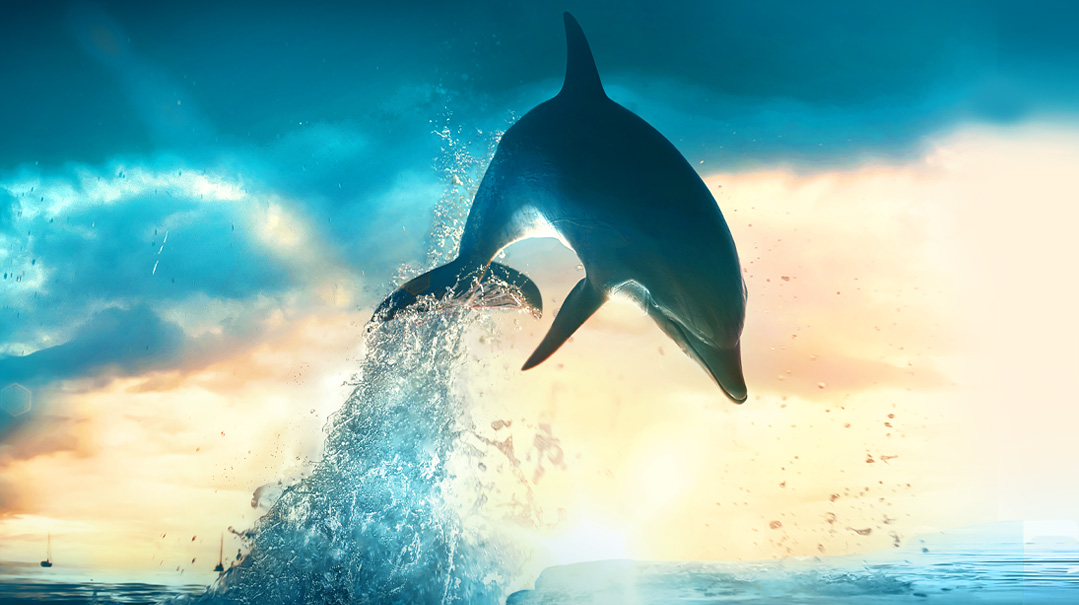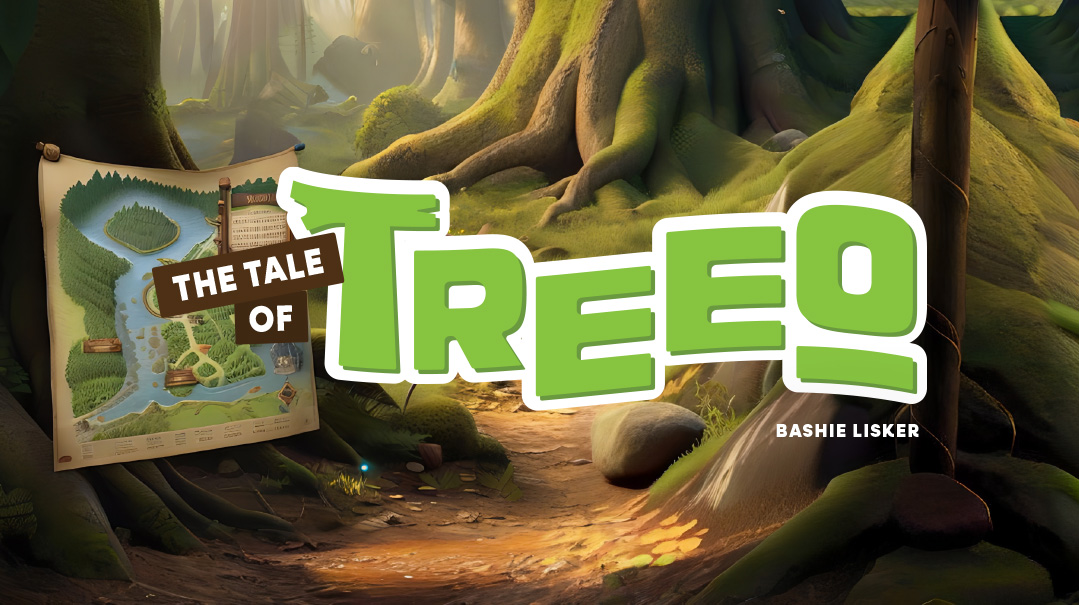Leaping to Save Lives
| November 1, 2022Incredible tales of how dolphins have saved humans

Many different kinds of animals can be trained to help humans. You have probably heard of service dogs who lead people who are blind, or dogs that search for bombs or missing people. There are even ponies, birds, and rats that are trained to save human lives. But you may not have heard that dolphins can save humans, too. And dolphins are different: Unlike all these other animals, dolphins save human lives in the wild. They aren’t trained. People didn’t teach them what to do. The dolphins do it all by themselves!
What?!
Yes, it’s true. Dolphins save people on their own, without being trained. There are many stories of people who almost drowned or very nearly got eaten by sharks before a dolphin or pod of dolphins (that’s what a group of dolphins who travel together is called) came and saved them. These stories go back as far as the ancient Greeks. Don’t believe me? For a while, a lot of people didn’t believe these stories were true. After all, the Greeks had a lot of mythological stories that were entirely made up. Today, however, there are many accounts of dolphins saving humans — with witnesses to prove it. Dolphins save human beings, and they do it without any training at all.
1700s
One of the first accounts we have of dolphins saving people was way back in the 1700s when Vietnam was invaded by China. The Chinese sank a whole ship of Vietnamese sailors. Obviously, they had planned to kill them. But there was a pod of dolphins nearby who came to their rescue and saved their lives .
1996
A man named Martin Richardson was swimming in the Red Sea (you know, the Yam Suf), when a shark attacked him. He felt a shark take a bite out of his side and then another one out of his upper arm. You would think he’d be as good as dead by then, but instead, three dolphins circled him and scared off the shark! Even after the shark was gone, the dolphins stayed near Mr. Richardson until his friends came to rescue him. Mr. Richardson might have already been wounded, but his life was saved — by dolphins!
2000
A young boy and his father were out on a boating trip near Italy when the boy, Davide, fell out of the boat and into the water. His father didn’t notice he was gone until he turned to see a dolphin pushing Davide toward him. The dolphin brought Davide close enough that his father could grab him and bring him back into the boat. It was a good thing, too, because Davide couldn’t swim. If not for that dolphin, he would have drowned.
2002
In Australia, a man named Grand Dickson went fishing when his boat broke apart in the water. He was left alone, bleeding, holding on to a piece of his boat for dear life. That piece of boat became worthless, however, when a group of sharks surrounded him. Luckily for him, a pod of dolphins came to his rescue. They circled him and scared off the sharks until they left Dickson alone.
2004
In 2004, a group of lifeguards were training in the sea when a huge shark appeared out of nowhere. We don’t know if the shark would have attacked them, but luckily they didn’t have to wait around to find out. A pod of dolphins surrounded the lifeguards, waving their tails and making a lot of noise until the shark was scared away.
2014
A group of scientists were studying a bunch of wild dolphins. For days the dolphins stayed in the same area, feeding on the food available there. One day, out of the blue, one dolphin broke away from the group and started swimming in a totally different direction. The rest followed. The scientists, confused at the unusual behavior, followed the dolphins, who stopped when they got to a girl in the water. The scientists rescued the girl and her life was saved. Somehow, the dolphins had sensed that someone was in trouble off in the distance and went to find her.
At one point, twelve divers got lost in the Red Sea. They were lost for thirteen and a half hours, and for the entire time, dolphins surrounded them to keep sharks away. When the rescue boat came, dolphins leapt in front of it, to show the rescuers where the divers were.
It’s not just humans
There are many stories of dolphins saving animals as well:
In New Zealand, a pod of whales got stuck on the shore when the tide was low. Even at high tide, the whales were so confused that they couldn’t make it back to the ocean. They would have died if not for the group of dolphins who swam to the shallows and led the whales back out to sea.
Turbo, a dog, nearly drowned in the ocean. A group of dolphins surrounded Turbo. When a boat approached, the dolphins splashed and made so much noise it seemed they were trying to let the people in the boat know there was a dog drowning.
Definitions
Pod — a group of dolphins
Cetaceans — the group of marine mammals to which dolphins belong. Whales are part of this category.
In Numbers
15
the number of minutes dolphins can hold their breath
3-5
the number of times per minute a dolphin comes up to breathe
11-18 months
the length of time dolphins carry around their young after they are born
25 years
the average lifespan of a dolphin
61 years
the longest a dolphin has lived
1,000
the largest number of dolphins in a pod
20 feet
how high into the air a dolphin can leap
40
there are 40 different species of dolphins around the world
Dolphin Therapy
So dolphins help humans. And dolphins are extremely smart. You could leave it at that and hope that the next time you find yourself facing a great white shark, a dolphin will come to your rescue. Some people, however, are not content to leave it at that. These people have taken note of the extraordinary dolphin and decided to create dolphin therapy. What is that and how does it work?
There are more than one hundred programs that offer people the opportunity to swim with dolphins in order to achieve healing. In each of these places, people bring their children who have neurological conditions like autism or brain damage from accidents. People bring their children in the hope that they will be helped by swimming with dolphins. They say the clicks and sounds the dolphins make can change the brain waves inside a human brain.
In dolphin therapy, the patient is brought into an enclosure in the water where dolphins are swimming. In some places, the dolphins are tame and used to humans. Others use wild dolphins and take patients out into the open. There are therapists in the water working with the patient while the dolphins swim around them.
Does it work? It’s hard to say whether dolphin therapy actually works or not. People who take their children for dolphin therapy are usually desperate. They have tried everything and nothing worked. But there are some success stories: people who are calmer, or behave better — there is even a child who walked for the first time after dolphin therapy! It could be the dolphins, or it could be that it was a fun and calming experience that let the child relax. What do you think?
Why?
What would make an animal try to save a human life?
Scientists don’t really know why dolphins help humans, but they have many theories.
Some scientists believe that dolphins help humans because they care about them. Dolphins communicate via echolocation. This means that they make sounds and pay attention to how the soundwaves bounce off things in their surroundings to know what’s around them. Some scientists believe that dolphins can hear the sound of a beating human heart. When the heart beats fast, such as when a person is in danger, dolphins sense that and come to the rescue.
Other scientists think dolphins help people because they are curious. Dolphins are highly intelligent creatures, and just like you or I might find a baby bird wounded on the floor, find it interesting and help it out, a dolphin might, too.
If dolphins are actually saving humans just to help and protect them, however, that would make dolphins unique. It would make them the only animal in the animal kingdom to show true altruism — selflessness for others.
Dolphins are wild, brilliant animals that make their home in the sea. They are glorious, beautiful creatures that have been studied for years yet they remain puzzling in many ways. How smart they really are, and what they actually know, no one can really say. But the facts are there. Dolphins have saved humans—intentionally, and without being trained. Why? Well, for now, your guess is as good as mine.
(Originally featured in Mishpacha Jr., Issue 934)
Oops! We could not locate your form.






